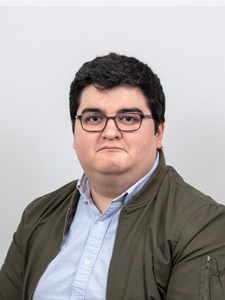27 Jul Creating New Knowledge: My Favorite Moment in College
My favorite moment in college would have to be the day I submitted my senior thesis. It was early May, just a few days before graduation. I had printed the lengthy Word document, went to campus to get the signatures for my thesis advisor and three readers, and made my way to the UTSA Honors College office to finally submit it. It was the last step. My classes had ended, my finals completed. This thick packet of papers was all I needed to graduate.
My thesis was the culmination of over a year of original research and translation. I majored in history, and I specifically combined my minor in Russian to specialize in the history of the Soviet Union. I enjoyed all of the related classes I took, and simply passing them would have been enough to graduate like most other students. Even as an Honors College student, I was not required to complete a senior thesis. It was strictly optional, a challenge meant to prepare students for graduate school and get them to actively create knowledge, instead of simply absorbing it. This was especially interesting to me as a liberal arts major, since the usual perception of undergraduate research is a STEM student, busy in a lab.
 Like most other authoritarian regimes, the Soviet Union heavily drew on propaganda to shape their people’s understanding of history, especially when it came to textbooks for schoolchildren. My thesis compared a range of textbooks published from the early years of the Soviet Union through to near its end. I was curious to see how overarching political and societal attitudes in the Soviet Union changed over time by seeing how each author addressed Bloody Sunday, a key event in the history of the Russian Revolution. This was no easy task since it involved identifying, obtaining, and translating Russian-language history textbooks. Even after I had chosen the relevant texts and decided on my interpretation of the textbooks, I had an even more challenging task. It isn’t enough to write a thesis; it has to be capable of defending the merits of its own claims. My three thesis readers were all history professors, and one specifically taught Russian history. I could only include facts I could cite or bring in supporting arguments from other historians. None of this should sound unfamiliar to anyone who’s written a college paper, but the level of scrutiny was high. It was challenging. I had to greatly narrow the focus of my arguments, and even completely rewrote my thesis.
Like most other authoritarian regimes, the Soviet Union heavily drew on propaganda to shape their people’s understanding of history, especially when it came to textbooks for schoolchildren. My thesis compared a range of textbooks published from the early years of the Soviet Union through to near its end. I was curious to see how overarching political and societal attitudes in the Soviet Union changed over time by seeing how each author addressed Bloody Sunday, a key event in the history of the Russian Revolution. This was no easy task since it involved identifying, obtaining, and translating Russian-language history textbooks. Even after I had chosen the relevant texts and decided on my interpretation of the textbooks, I had an even more challenging task. It isn’t enough to write a thesis; it has to be capable of defending the merits of its own claims. My three thesis readers were all history professors, and one specifically taught Russian history. I could only include facts I could cite or bring in supporting arguments from other historians. None of this should sound unfamiliar to anyone who’s written a college paper, but the level of scrutiny was high. It was challenging. I had to greatly narrow the focus of my arguments, and even completely rewrote my thesis.
Ultimately, my thesis was much stronger for it. I submitted it confident that I had made claims supported by the evidence, and that my historical analysis was sound. Perhaps my topic may not interest many others, and I’m sure no one will cite my thesis in their work the way I cited historians in my own. Nevertheless, for that year-long period, I was able to create new knowledge that didn’t exist before. Textbook passages that were previously only accessible to those who can read Russian were available to an English-language audience. That meant something to me, and that is why my favorite moment in college was finally submitting my thesis. I hope if you are reading this, and you have the opportunity to create instead of simply consuming, you’ll also choose to create.
